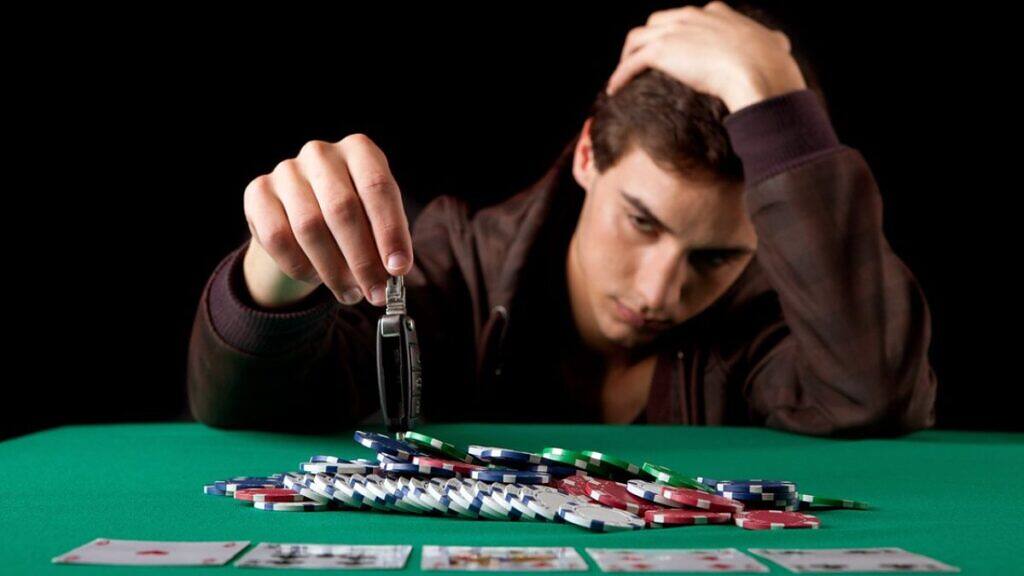Gambling addiction is one of the lesser talked about addictions. Perhaps because it doesn’t involve a substance, it is not considered as harmful as drug or alcohol addiction.
Recent research, however, concluded that problem gamblers are 15 times more likely to commit suicide as a direct result of the consequences of their gambling.

Gambling Addiction and Mental Health
Gambling addiction is recognised around the world as a mental health behavioural addiction. It was the first of its kind to be classed in the same group as substance addictions.
The reason for its classification is that studies have found that gambling for a gambling addict has the same effect on the brain as a drink or drug does for an alcoholic or a drug addict.
Gambling comes in many forms, but someone who compulsively gambles will usually favour one form over others.
Typical forms of gambling include:
- Sports betting – dogs, horses, football, boxing
- Card betting
- Roulette gambling
- Lottery and scratch cards
- Slot machines
Gambling addiction is also known as gambling disorder, compulsive gambling, problem gambling and pathological gambling. These terms all mean the same thing but in varying degrees of severity, and the terms are used interchangeably.
An individual may start as a problem gambler, which is when there is an urge to gamble despite harmful negative consequences or a desire to stop gambling but then progress to clinical pathological gambling, gambling disorder or gambling addiction, the most severe forms of problem gambling.
Pathological gambling, gambling disorder and gambling addiction are diagnosed when an individual meets a criterion similar to someone suffering from a substance misuse addiction.
Do I Have a Gambling Addiction?
If gambling is costing you more than just money and is affecting other areas of your life, you could well have a gambling addiction.
Ask yourself honestly if you identify with any of the following criteria, detailed within the Diagnostic and Statistical Manual of Mental Health Disorders, 5th edition (DSM5), used by professionals to diagnose a gambling disorder:
- You often gamble when feeling distressed (e.g., helpless, guilty, anxious or depressed)
- After losing money gambling, you often return another day to try and get even (“chasing” your losses).
- You have lied to conceal the extent of your involvement with gambling.
- You have jeopardised or lost a significant relationship, job, or educational or career opportunity because of gambling
- You have needed to gamble with increasing amounts of money to achieve the desired level of excitement
- You feel restless and irritable when attempting to reduce or stop your gambling
- You have made repeated unsuccessful efforts to control, reduce or stop gambling
- You are often preoccupied with persistent thoughts of gambling relating to past gambling experiences or planning the next gamble and how to get the money to fund it.
If you identify with any of these symptoms of gambling addiction, please understand that you have a mental health disorder and will likely require professional gambling addiction treatment to get well and stop gambling.
Understanding Compulsive Gambling
For an outsider, it can be challenging to comprehend why an individual would continue to gamble despite losing large sums of money, accumulating debt, threatening their significant relationships with others and causing themselves untold harm and stress.
To understand what drives a gambling addict to gamble compulsively despite mounting negative consequences, let us go inside a gambling addict’s brain.
The BBC filmed the following clip tracked the brain activity of a compulsive gambler while they gambled from inside an MRI machine:
The scientific findings prove that for a compulsive gambler or gambling addict, the same parts of the brain are stimulated as in someone with an alcohol or drug addiction. Not only does gambling “win” stimulate the release of vast amounts of feel-good chemicals into the brain, but a “near miss” also has the same effect.
It is the effect produced by the brain while the individual engages in gambling that a gambling addict cannot get enough of.
Help For Gambling Addiction
If you or a loved one have a problem with gambling and want help, the type of help you are recommended to access will depend on the severity of the gambling problem.
Some individuals who are in the early stages of problem gambling respond well to CBT therapy in the community and support from groups such as GamCare or Gamblers Anonymous. Still, if your problem is severe and you are unable to stop gambling, it may well be that you need private rehab for gambling addiction treatment.
Rehab For Gamblers
Most private rehabs can only accommodate an individual with a behavioural addiction if it is accompanied by an alcohol or drug misuse problem. The reason for this is that private rehabs are only licensed to treat substance misuse. However, it is not uncommon for a gambling addict to have an issue with alcohol, drugs or prescription medications alongside their gambling, even if their gambling is the main problem.
Most compulsive gamblers who require inpatient treatment have reached a stage where they feel very depressed and hopeless about their situation. This is where gambling addiction can become life-threatening.
For information on private rehabs that can treat gambling addiction successfully and are CQC registered and regulated, please call Detox Plus UK and speak with one of our friendly addiction experts, who will be happy to help.
If you are struggling with a gambling addiction, please seek help today.


